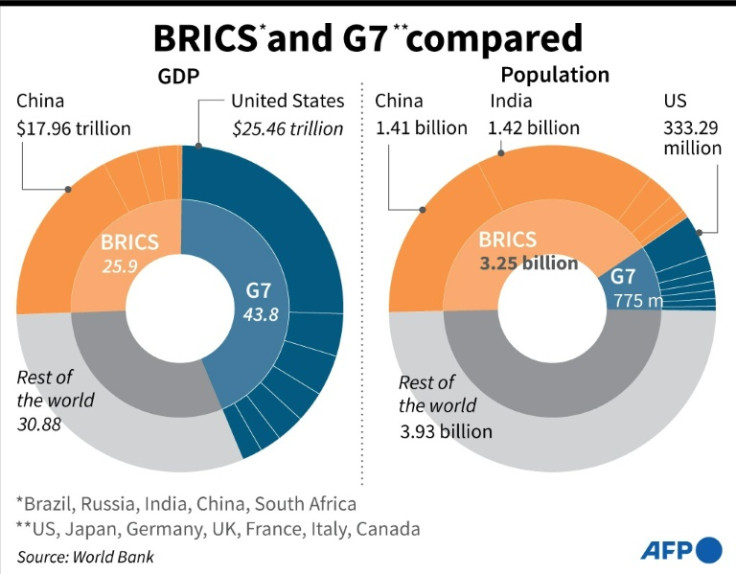Join The Club: BRICS Faces Rift Over Push For New Members

BRICS leaders meeting in South Africa this week will consider expanding the five-nation bloc at a time of great interest in the group that accounts for a quarter of global wealth.
Opinions differ between Brazil, Russia, India, China and South Africa over accepting new members into the loosely-defined club of major emerging economies that is seeking an alternative to the Western-led international order.
Here are some key issues as the BRICS convene in Johannesburg:
South African officials say more than 40 countries have shown some level of interest in joining the BRICS from across the 'Global South', a broad term referring to nations outside the West.
Like the BRICS members themselves, these countries represent varying political systems, uneven economic strength, and contrary diplomatic positions, and are as diverse culturally and geographically as Argentina, Saudi Arabia, Kazakhstan and Vietnam, to name a few.
Many are traditionally non-aligned nations, such as Indonesia and Ethiopia, and some are openly hostile to the United States and its allies, such as Iran and Venezuela.
Some 50 heads of state and government will attend the summit, officials say.
Analysts say China, the most powerful of the BRICS economically, is eager to rapidly grow the club into something of a counterpoint to the G7 group of wealthy democracies.
In July, Foreign Minister Wang Yi described the BRICS as "the most important platform for cooperation among emerging markets and developing countries" and said China was ready to work with other members to "expand and strengthen" the bloc.
BRICS offers Beijing a forum where it can "cast itself as kind of the champion or the vanguard of the developing world and the global south," said Brian Hart from the Center for Strategic and International Studies.
"Beijing views BRICS as a very unique venue for expanding its influence globally," said Hart, a fellow at the Washington DC-based think tank.
Russia and South Africa also support adding new members but this desire runs counter to India, the other major power in the BRICS, and an economic and geopolitical rival of China.
New Delhi is wary of the BRICS becoming an organ for Beijing to project its agenda and analysts say this conflicting interest could determine who might be admitted in years to come.
"China and India's disagreement regarding membership expansion will shape the prospects of aspiring BRICS countries and the organisation's future," wrote Hung Tran, a non-resident senior fellow at the Atlantic Council this month.
Brazil's President Luiz Inacio Lula da Silva on Tuesday said he supported the entry of "several countries", including Argentina.
Analysts say when considering new members, South Africa, India and Brazil must balance a desire for ties with China and Russia against the risk of estranging a major trading partner in the United States.
"Further expansion needs to be balanced in terms of not making it an anti-Western alliance that includes Venezuela and Iran," said Jakkie Cilliers, founder of the Pretoria-based Institute for Security Studies think tank.
Cobus van Staden, a senior researcher at the South African Institute of International Affairs, said even admitting less controversial members could greatly impact the profile and clout of BRICS.
"For example if Saudi Arabia joins, that would also kind of bring some additional geopolitical weight to the bloc," he said.
Three aspiring members -- Bangladesh, United Arab Emirates and Egypt -- were admitted in recent years to the BRICS development bank that wants to offer an alternative to the World Bank and International Monetary Fund.
Uruguay's application to join the Shanghai-based New Development Bank is also being considered.
South Africa's Foreign Minister Naledi Pandor characterised this as an expansion of sorts and said BRICS members at the summit would be presented with a proposal regarding criteria for new members.
"It is hard to see what the criteria would be for expansion. The BRICS is a very diverse group and it's questionable whether China is powerful enough to exert its will," said John Stremlau from the University of the Witwatersrand in Johannesburg.
© Copyright AFP 2025. All rights reserved.





















